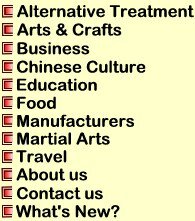|
|
|
|

|
|||
| (Strategic) |
|||
|
War is important to the country, either to win or ruin and as matter of life or death. This is the reason why thorough analysis is vital. |
|||
|
|
Five Basic elements: |
||
|
|
(1) Politics: |
||
|
|
(2) Weather: |
||
|
|
(3) Terrain: |
||
|
|
(4) Commander must have: a. Wisdom b. Sincerity c. Benevolence d. Courage e. Strictness |
||
|
|
(5) Discipline: |
||
| Seven vital answers: |
|||
|
|
(1) Which country's sovereigns rules his people in harmony with Moral Law? (2) Which sides General is more capable? (3) Which sides terrain has the better advantages? (4) Which side enforces rigorous discipline? (5) Which army is stronger morally as well as physically? (6) Which army is highly and disciplinal trained? (7) Which army implements both reward and punishment? |
||
|
|
|||
|
(1) General should listen to his counsel's advice and acting upon it will lead to success. |
|||
|
(1) Seem unable when able to attack. |
|||
|
(1) He who employs thorough calculations/planning will win the battle. |
|||
| "Know yourself first, then know your opponent, and win thousand battles". |
|||
|
(1) Analyze the nature of the business, strategy, products, marketing etc. |
|||
|
|
|
|
| (Waging War) |
||||
|
Calculate the cost of the required equipment in a war operation, including all basic necessities together with salary to be dispatched to the army. |
||||
|
|
(1) Country's treasures will decrease. |
|||
|
(1) Haste in war may be stupid, but timing will save many costs. |
|||
|
|
|||
|
(1) Second levy of conscripts will never be called. |
|||
|
|
|||
|
|
|||
|
(1) Budget in detail before setting up any business. |
|||
|
|
|
|
| (Attack by Stratagem) |
||||
|
|
||||
|
(1) Avoid Besieging walled cities - This is a lengthy and costly operation. |
||||
| (1) Surround the enemy if numbers are ten to one. (2) Attack enemy if numbers are five to one. (3) Divide enemy if numbers are two to one. (4) Engage enemy with good plan if in equal number. (5) Avoid engaging enemy if numbers are lower. |
||||
|
|
|||
|
(1) "Hindering the Army" - commanding the army to advance or retreat when both situations are impossible. |
|||
|
|
|||
|
(1) Know when to fight and when not to fight. |
|||
|
Merger or takeover |
|||
|
|
|
|
| (Tactical Disposition) |
||||
|
(1) Will win the war by knowing the possibility of defeat by others first, then waiting for a better chance to attack. |
||||
|
|
||||
|
(1) Defense - Hide in the most secret place if the army does not have enough strength to conquer. |
||||
|
(1) Know all the weak points of the enemy before the war begins. |
|||
|
|
|||
|
(1) Measuring the size of the enemy's terrain will help to set up plan. |
|||
|
|
|||
| (1) Solid foundations and sound financial situations are the factors vital to planning any expansion of the Company. (2) Do not advance when the situation is not favorable and keep the entire future expansion program in secret. (3) Implement Company rules, systems and discipline on all levels. (4) Before expansion, analyze the new project by using method of Measuring, Estimating, Calculating and Comparing in order to ensure victory. |
|||
|
|
|||
|
|
|
|